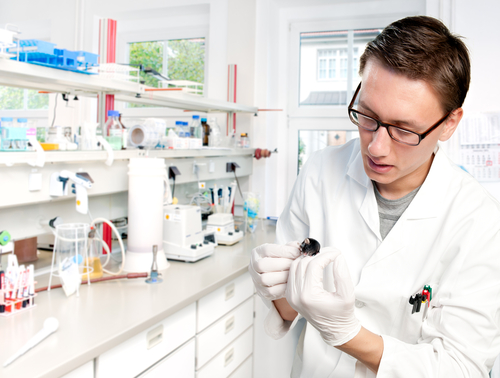Mice Studies Suggest Cathepsin S to Prevent Lung Inflammation in COPD, CF
Written by |

Activation of PP2A enzyme with consequent modulation of cathepsin S levels may represent a new strategy to prevent chronic obstructive pulmonary disease (COPD), a mice study shows.
This finding was reported by a team led by researchers from Queen’s University Belfast in a study published in the American Journal of Respiratory and Critical Care Medicine, titled “Protein Phosphatase 2A Reduces Cigarette Smoke-Induced Cathepsin S and Loss of Lung Function.”
COPD is currently the third-leading cause of death in the United States, and is a major global health problem. The primary environmental contributing factor for COPD development is long-term exposure to cigarette smoke.
Cellular stress caused by smoke exposure activates inflammatory and proteolytic (involved in protein’s breakdown) mediators that support the underlying mechanisms of COPD development. Several enzymes involved in protein recycling processes, including cathepsins, have been implicated in COPD progression.
Previous studies have found that cathepsin S (CTSS) is increased in bronchoalveolar lavage fluid (BALF) and blood of patients with COPD; however, their role remains unclear.
In the new study, researchers analyzed levels of CTSS in mice and human samples exposed to smoke. The team found that smoke exposure resulted in a significant increase in CTSS activity in BALF and lung tissue biopsies.
Next, the team repeated the experiment, but with mice that had been genetically engineered to lack the CTSS enzyme. While non-modified animals developed symptoms similar to emphysema (a type of obstructive pulmonary disease) upon long-term smoke exposure, those lacking CTSS had fewer lung changes.
These mice lacking CTSS also had a reduced number of immune infiltrate cells in the lungs, compared to control animals, upon smoke exposure. They also showed less evidence of protein degradation and lung tissue remodeling during chronic cigarette smoke exposure.
Further analysis of human bronchial epithelial cells collected from smoker and non-smoker COPD patients revealed that, at least in part, CTSS’ contribution for lung function changes was triggered by the activity of PP2A enzyme.
Inhibition of PP2A in these cells, either by genetic manipulation or with a small molecule inhibitor, promoted the production of CTSS in immune cells relevant for COPD.
To confirm these findings, the team treated mice with a PP2A inhibitor while they were exposed to cigarette smoke daily. Treated mice had significantly more infiltrating immune cells into the lung, as well as increased levels and activity of CTSS compared with untreated animals.
In contrast, mice treated with a small molecule activator of PP2A experienced the opposite effect. They had reduced smoke-induced immune cell infiltration into the airways, which was coincident with reduced amounts of CTSS in the lungs.
Long-term treatment with this PP2A activator was shown to induce significant changes in the mice’s lung function and lung tissue remodeling during smoke exposure.
“The decrease in PP2A activity that occurs in COPD contributes to elevated CTSS expression in the lungs, and results in impaired lung function,” the researchers said, suggesting that “enhancing PP2A activity represents a feasible therapeutic approach to reduce CTSS activity and counter smoke-induced lung disease.”
In another study, published in the European Respiratory Journal, this team demonstrated that CTSS may also contribute to the development of cystic fibrosis (CF). Inhibition of CTSS, or of its downstream target protease-activated receptor2 (PAR-2), led to a significant reduction in lung inflammation, lung damage, and mucus obstruction in mice with CF.
“We know that [CTSS] plays a key role in provoking symptoms of chronic lung diseases such as CF and COPD. We have now discovered that treatment to target this specific enzyme can significantly reduce inflammation, lung damage and mucus obstruction, key hallmark features of CF and COPD,” Cliff Taggart, PhD, professor at Queen’s University Belfast and senior author of both studies, said in a news release.
“There is a high unmet need for effective anti-inflammatory therapies for patients with these chronic lung diseases, and targeting of cathepsin S is a promising strategy that can now be tested in future clinical trials,” said Marcus Mall, MD, professor at Charité Universitätsmedizin Berlin and one of the co-authors of the CF study.




